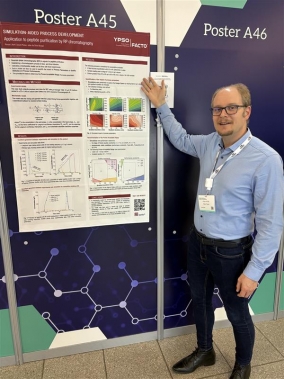Publications
- Home
- Publications
- Simulation-Aided Process Development
Simulation-Aided Process Development
Application to peptide purification by RP Chromatography
Dr. Ronald Jäpel (Ypso-Facto), Dr. David Pfister (Ypso-Facto), Dr. Joao Da Silva Burgal (Ypso-Facto)
- by Ypso-Facto
- November 24, 2025
Reverse-phase chromatography (RPC) is a key technique for peptide purification, but establishing robust processes remains experimentally intensive and time-consuming. Mechanistic modeling provides an efficient route to accelerate process development by reducing the number of experiments while enabling a deeper understanding of chromatographic behavior.
In this work, a mechanistic model was developed for the reverse-phase purification of peptides. The model combines the mixing-cell approach with a linear driving force (LDF) approximation and a dedicated isotherm to accurately describe peptide–stationary phase interactions. Simulation results showed excellent agreement with experimental data, capturing the transition from Langmuir-type (tailing) to Moreau-type (fronting) elution profiles across varying load conditions.
The model was used to explore the design space by varying load and gradient duration. This enabled the identification of the region satisfying both quality constraints (L1 < 1.1%, L2 < 0.032%, H1 < 1.4%) and performance constraints (Yield > 86%, Productivity > 75 g/L/min), leading to the recommendation of a Proven Acceptable Range (PAR) of 2.3–5.8 g/L column load and 51–114 min gradient duration.
This study illustrates how simulation-driven approaches can effectively support peptide purification process development, providing a robust and cost-efficient framework for defining the Edge of Failure and establishing reliable operating ranges.
Recent publications
- November 24, 2025
Simulation-Aided Process Development - September 18, 2025
Kinetic Modeling of Solid-Phase Oligonucleotide Synthesis: Mechanistic Insights and Reaction Dynamics - September 18, 2025
Purification of a Viral Protein by Ion-Exchange Chromatography: Methodology for Mechanistic Modeling and Comparison with a Statistical Approach

Ypso-Facto is a service company helping industrial firms to develop, optimize and secure their chemical processes and bioprocesses.
Contact Us
-
Address: 19 avenue Foch
54000 NANCY - FRANCE -
LU +352 20 21 39 14
FR +33(0) 355 961 650
- contact@ypso-facto.com

